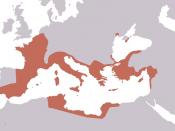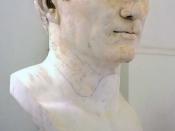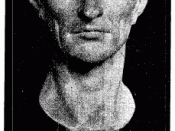Translated from Italian into English, The Life of Caesar, by the noted Italian historian Guglielmo Ferrero, is, as the title would suggest, a biography of the great Roman Dictator Julius Caesar. Ferrero's book, however, cannot be described just as a biography. His work, in fact, can be more accurately defined as a complete history not only of Julius Caesar's life, but also of his times, the time of the fall of the Roman Republic. Characterized by its immense learning and its fullness of details, Ferrero's work is certainly interesting and definitely deserves a place on the library shelf of any institution where there is a serious interest in Roman history. However, if he intended to offer us a true picture of history, he fails in his aim when arguing that Caesar's greatest work for posterity was determined not by the founding of the Empire, but by "the conquest of Gaul, to which [Caesar] himself attributed so little importance" (515).
This paper, while praising Ferrero as a writer and as an historian, will also analyze his aversion toward Caesar, which indirectly permeates his entire work.
Nevertheless, it is important to observe that every historian of the past is also a man of his age, and nobody is free from bias. Ferrero was predisposed to criticize Caesar because of his philosophical and political inclinations. As a writer with republican sympathies, who was exiled by Benito Mussolini in 1930 and whose works were, proscribed by the Italian government in 1935, Ferrero was an outspoken opponent of Fascism in Italy. Consequently, it is easy to realize that his condemnation of Caesar clearly reflects his loathing for the Fascist regime in Italy.
The first fourteen chapters of the book do not see Caesar as the main character, but they present the history of Rome...


